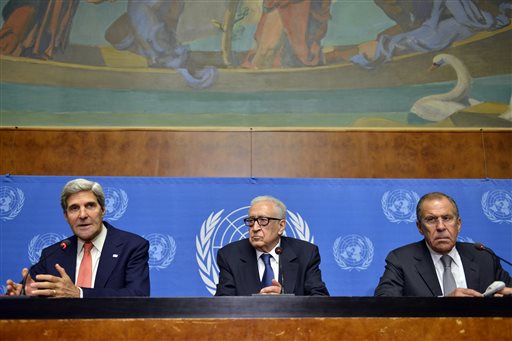According to the New York Times, in a just-announced deal with the Russians, the United States has agreed to give Syria until the middle of 2014 to destroy or remove its chemical weapons. Should the Assad regime fail to comply, the United States has also agreed that the matter will be turned over to the United Nations Security Council, where Russia can use its veto power to ensure that no military action is taken against Syria.
The Associated Press reports that Syria’s failure to comply would result in the U.S. and Russia seeking a “U.N. Security Council resolution that could authorize sanctions – short of military action[.]”
U.S officials stress that “President Barack Obama retains his right as U.S. commander-in-chief to conduct military strikes to defend American national security interests in the absence of U.N. authorization.” This, apparently, would be a measure of last resort after an attempt to resolve the issue through the United Nations fails.
Last week in London, Secretary of State John Kerry said the Assad regime could avoid military action by turning over all of their chemical weapons in one week. This new agreement appears to stretch out to nine months.
This agreement also appears to be a serious reversal with respect to President Obama’s demand that Assad must go. This agreement requires the direct assistance of Assad’s government.
As the AP points out, Obama might have avoided a military showdown with this deal, but his overall Syrian policy is in “disarray“:
In an address to the American people, Obama said he was working with U.S. allies to “provide humanitarian support, to help the moderate opposition and to shape a political settlement” for ending a conflict that has killed more than 100,000 people and made refugees of millions more.
That simple message belies a hodgepodge of often contradicting goals and strategies unlikely to be resolved by the new international effort to get Bashar Assad’s government to relinquish its chemical weapons or by any U.S. military action if diplomacy fails.
These include Obama’s vacillations on providing military assistance to rebels as part of a peace strategy and his repeated demand that Assad relinquish power but still retain a veto over any replacement government.
The difficulty in understanding what America is trying to do in Syria has persisted in the current debate over how to respond to the Assad government’s alleged use of chemical weapons.
Threatening military reprisals, Obama said that the “United States military doesn’t do pinpricks” only a day after his top diplomat, Secretary of State John Kerry, promised an “unbelievably small” operation.
It is not hard to imagine a scenario where Assad uses this complicated deal as a way to tie America up in diplomatic knots for years as it holds on to its chemical weapons and pounds demoralized Syrian rebels who had counted on U.S. airstrikes, are still waiting for weapons promised long ago, and took Obama at his word about how Assad must go.
From the looks of it, Vladmir Putin got everything he wanted and the United States will have to wait until Obama’s second term is almost half-over before airstrikes can be threatened again.
Follow John Nolte on Twitter @NolteNC

COMMENTS
Please let us know if you're having issues with commenting.